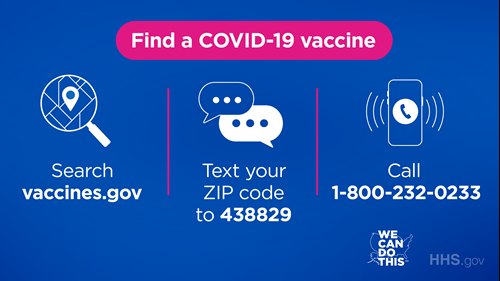State Auditor's E-Update - 5/21/2021
1. Message from Auditor Blaha
2. Due: GAAP Basis City and Town Reporting by June 30, 2021
3. Due: Performance Measurement Program Report by July 1, 2021
4. Available: Relief Association Investment Performance Tools
5. TIF: Reporting "Non-TIF" Bonds
6. Avoiding Pitfall: Credit Cards - Detailed Receipts Required
1. Message from Auditor Blaha
This week I'm highlighting the We Can Do This campaign from the White House for their Digital Day of Action today. Across the country, over 60% of adults have received at least one dose of the COVID-19 vaccine. In Minnesota we have hit 63% for individuals 16+ receiving at least one dose of the COVID-19 vaccine. If you would like to track Minnesota's progress, click here.
Here's the link to the We Can Do This public education campaign which has resources and educational materials in order to increase confidence and understanding, particularly for those who have been waiting or are hesitant, about getting vaccinated. On the website you will find materials that you may narrow by audience, format (social media, flyer, radio ad, etc.), language, and topic. This is a reminder that there is no cost to receiving the COVID-19 vaccine. Here are some simple ways to find a vaccine:
- Search https://www.vaccines.gov
- Text your zip code to 438829
- Call 1-800-232-0233
We are excited to help amplify the message to get vaccinated and I hope you will help spread the word in your community. As always, thank you for all you do. We can do this!

2. Due: GAAP Basis City and Town Reporting by June 30, 2021
For cities and townships reporting on the GAAP basis of accounting, the Reporting Form and Financial Statements/Audit are due by June 30, 2021. The Reporting Form and Financial Statements/Audit should be submitted through SAFES.
Management letters and component unit financial statements should be emailed as PDF attachments to GID.OSA@osa.state.mn.us.
3. Due: Performance Measurement Program Report by July 1, 2021
Participation in the Performance Measurement Program by a city or a county is voluntary. Counties and cities that choose to participate in the standard measures program must officially adopt and implement the ten minimum performance measures and system developed by the Council on Local Results and Innovation (Council). In order to receive the per capita reimbursement and levy limit exemption in 2021, if any, counties and cities must file a report (in a PDF format) with the Office of the State Auditor by July 1, 2021.
For more information on the Performance Measurement Program, please click here.
4. Available: Relief Association Investment Performance Tools
The Office of the State Auditor (OSA) provides two educational tools to help relief association trustees monitor investment performance. One tool, an “Investment Report Card,” is sent by email to each relief association after our review of the relief association’s financial and investment reporting form is complete. The report card provides one-year and multi-year rates of return calculated for the relief association, as well as a custom benchmark rate of return. The custom benchmark rate of return can be used to measure the relief association’s actual investment performance against market returns.
Another tool is the annual “Financial and Investment Report of Volunteer Fire Relief Associations” that is published annually by the OSA. The report includes one-year and multi-year rates of return, calculated custom benchmarks, asset allocations, and market values for each relief association in Minnesota. The report is available on the OSA website here.
5. TIF: Reporting "Non-TIF" Bonds
As TIF authorities work on completing TIF Annual Reporting Forms, form preparers should take note to understand how the reporting of "non-TIF bonds" differs from reporting TIF bonds. To learn more, please click here.
6. Avoiding Pitfall: Credit Cards - Detailed Receipts Required
Counties, cities, towns, school districts, watershed districts, and soil and water conservation districts have the authority to use credit cards for purchases. Monthly statements received from credit card companies generally do not provide sufficient detail to determine whether a purchase was made for a public purpose and not for a public employee’s or public official’s personal use. As a result, public employees/public officials should be required to turn in the original, detailed receipt for every purchase made with the public entity’s credit card.
This Avoiding Pitfall is available on our website here.